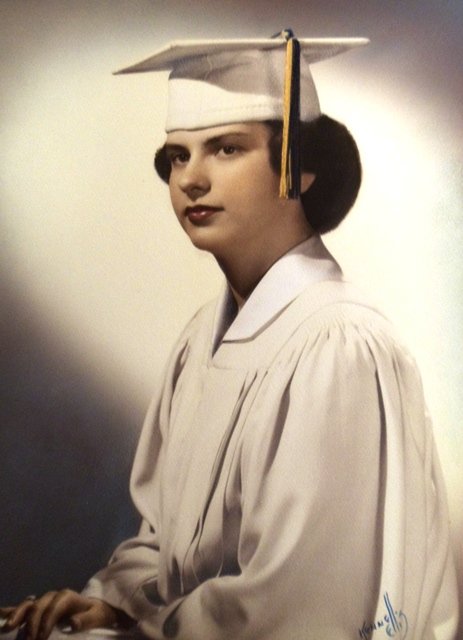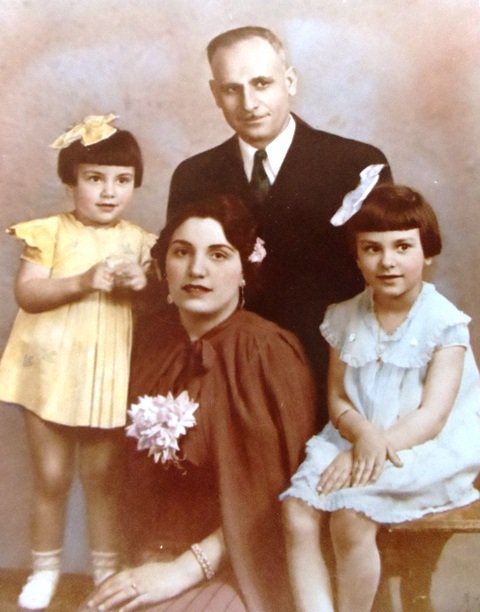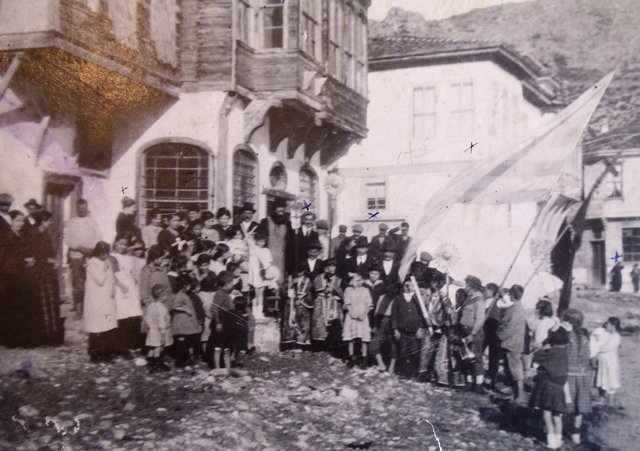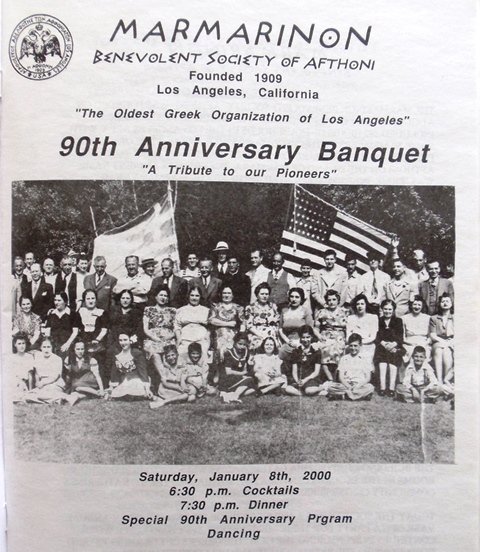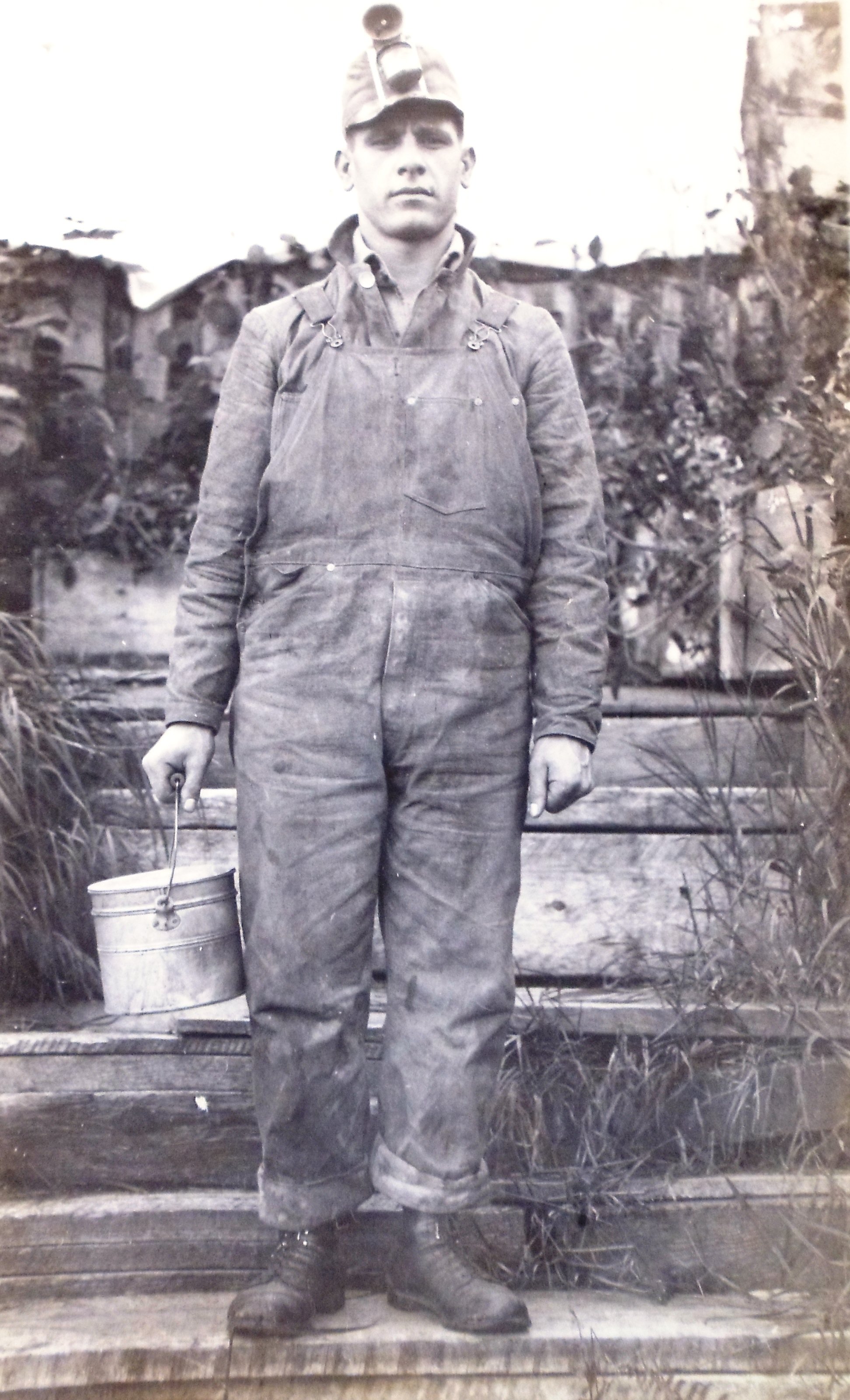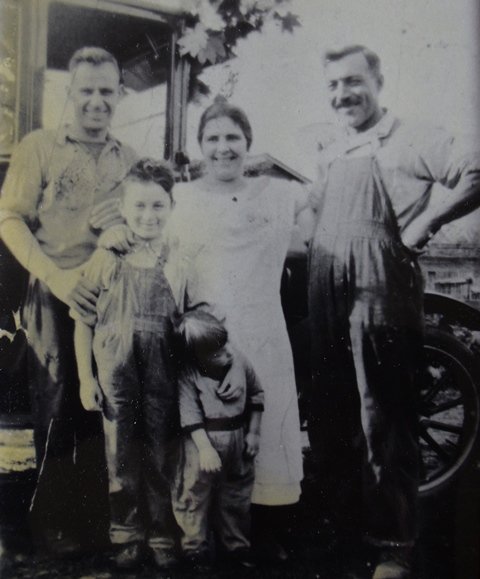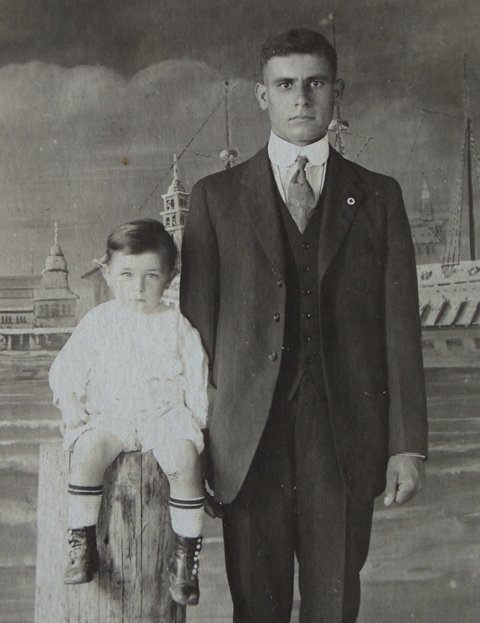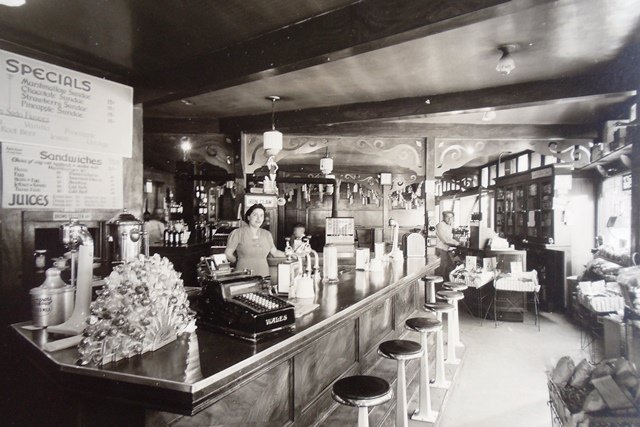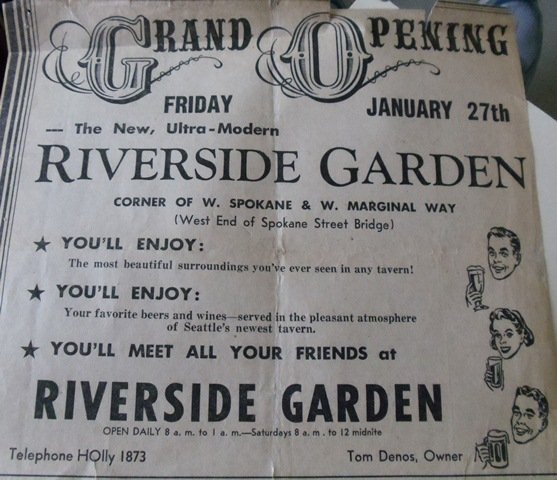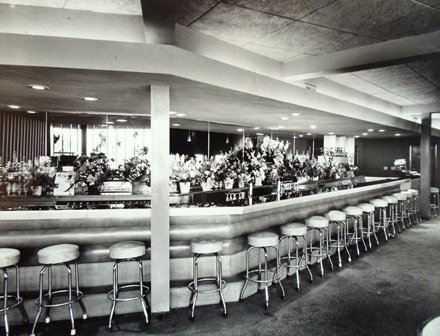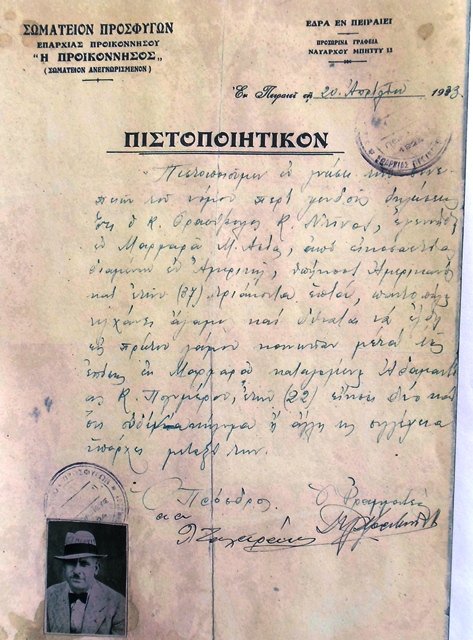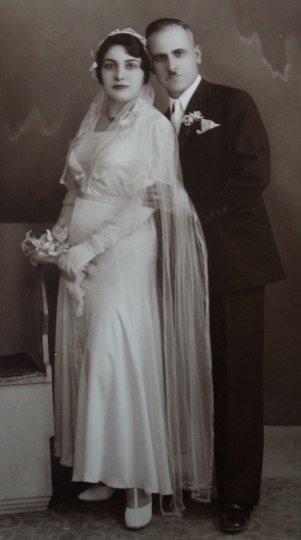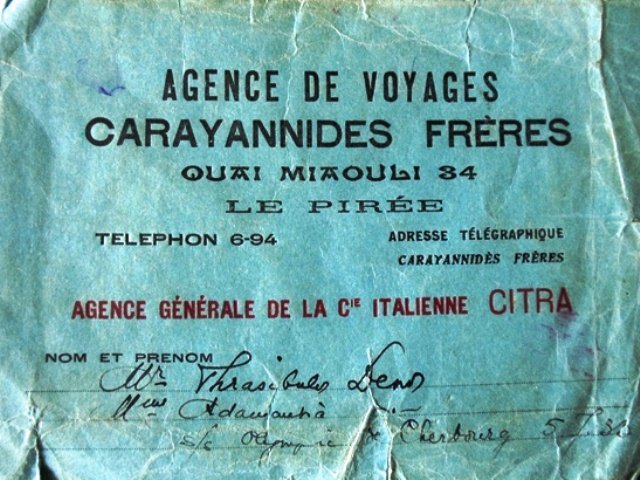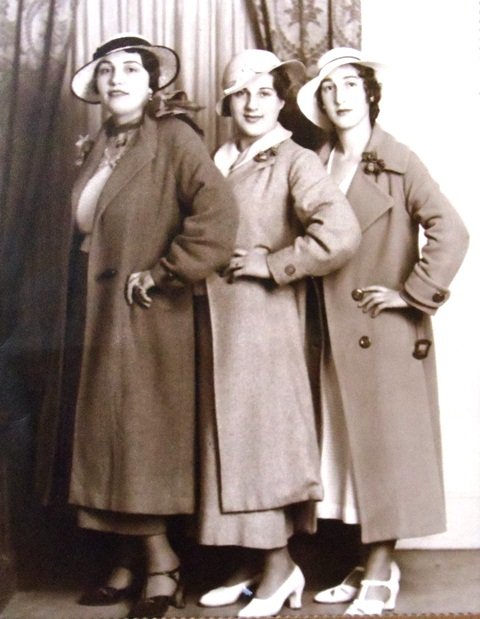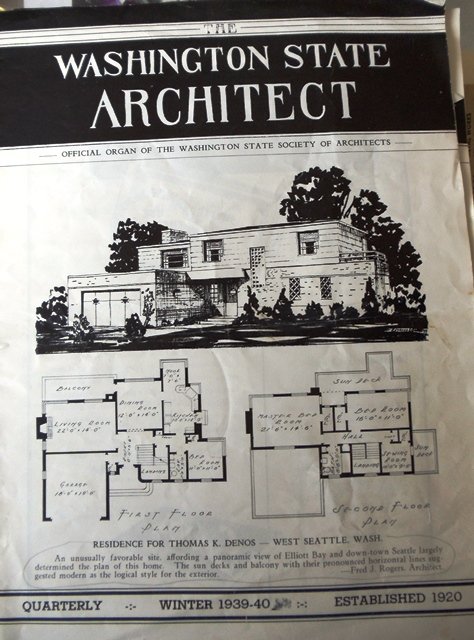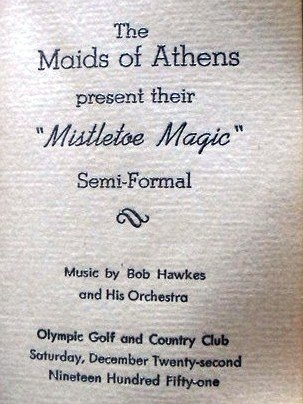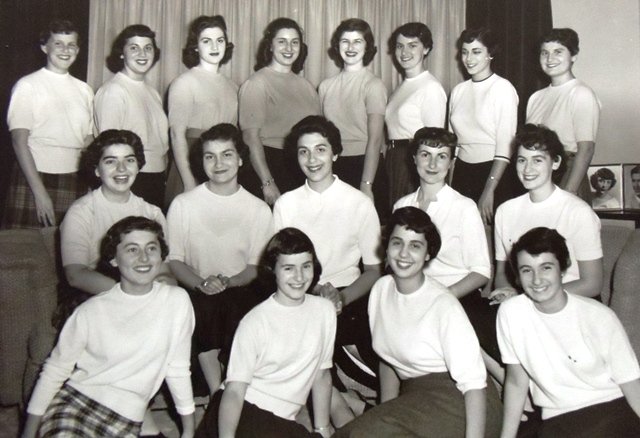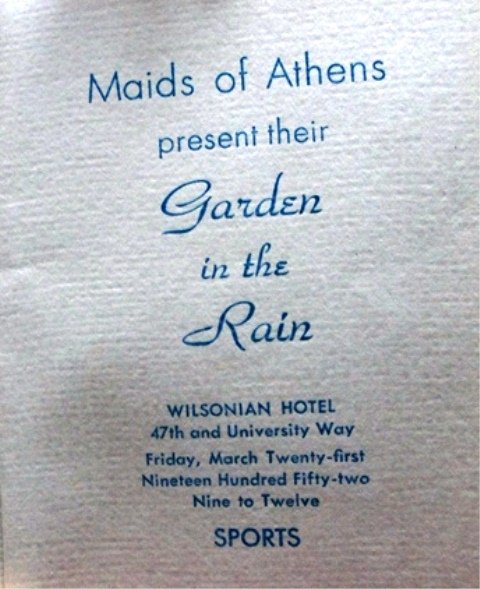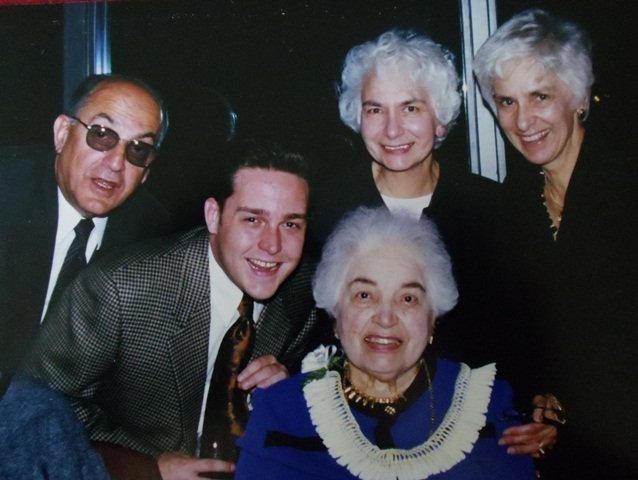Down By The Riverside
West Seattle was home for a large number of Greek families when Thalia and Kiki Denos were growing up. Their family home was a center of activity for many friends and relatives.
THALIA
Thalia (Euthalia) Thrasivoulos Denos was born on March 5, 1934, at Columbus Hospital (later St. Cabrini Hospital which closed in 1990) in Seattle, Washington. Although her birth certificate reads March 4, her mother insisted on the fifth and unless legal proof is required, Thalia has accepted her mother’s version. The family lived in a small home on Delridge Way then moved in 1939 to the home where Thalia still lives. She attended Lafayette Elementary, James Madison Junior High and West Seattle High schools. When she graduated in January of 1952 she went to work at the small law firm of Groff and Kelleran in the Dexter-Horton Building. She recalls her father surprising her by coming into her office while doing business in the nearby Hoge Building. In September of 1952 Thalia began studies at the University of Washington until her father died unexpectedly in 1954. Thalia’s cousin, Anna Evans (nee Damoulou), was working for the Veterans Administration (VA) and led Thalia to a job with the VA in Seattle’s Tower Building. Thalia enjoyed the security of the job and the payday lunches at El Gaucho, a nearby upscale restaurant. When the VA job was eliminated she worked for the U. S. Corps of Engineers for seven years but really wanted something more challenging.
On March 25, 1961 at a Greek Independence Day celebration, a friend, Dee Valison, told Thalia that Dee’s sister, Olga, would be leaving her job at IBM (International Business Machines). Thalia called Olga, set an appointment to be interviewed and began a 30-year career with IBM. Her work was in several divisions of the company. From 1973 to 1978 she spent time in Dallas, Texas, and San Diego, California, in management. She completed her career with IBM, retiring in 1991. In her retirement, Thalia has volunteered tirelessly for the Greek Orthodox Church of the Assumption. She has assisted the office managers and priests in a variety of tasks, and spent seven years assisting the Greek folk dance program. Her desire is “just to help out” where she can.
KIKI
Kiki (Kiriaki) Denos Dimitriou was born in Seattle and attended Lafayette, Madison and West Seattle as well as the University of Washington until her father died. She then worked at Peoples Bank in Seattle for 15 years. Kiki had known Ted Dimitriou through their church association and Ted would visit the Denos home with other young Greek friends. A radiology technician, Ted’s persistence continued. When Thalia and Kiki attended a church choir convention in Portland, Oregon, Ted was also there and Kiki told her sister she would have to find her own way back to Seattle. Ted and Kiki were married on August 26, 1961, in the Assumption Church’s new building. The church was not yet completed. The window openings were covered in plastic as the glazers were on strike and a white runner was placed over the construction paper on the floor as carpets had yet to be installed. Family friends helped move the pews into the new facility so the guests could sit down.
When their son was born in 1969 he was named Thrasivoulos after his grandfather. Since then he also uses the shortened name of Thom. Kiki became a stay-at-home mom while Thom was growing up and returned to work, also at IBM, for a short time. Kiki can be found next to Ted actively supporting his role as a parish council member and several terms as president, working at the church festival and managing their apartment building near the family home in West Seattle.
TOM AND ADAMANDIA
Thrasivoulos (Tom) or “T.K.” Denos was born in 1899 in the village of Afthoni on the island of Marmara off the coast of Turkey. Women on the island mostly did handiwork and the men caught and salted fish. Both
to Istanbul to sell. Thrasivoulos was next to the youngest of seven children. When his father died of a burst appendix, Thrasivoulos’ older brother George, then 12 years old, left the island to find work and provide some income for the family. There was little opportunity for young men of Greek heritage on the Turkish controlled island. Thrasivoulos left Afthoni and relocated to Patras, Greece, for an undetermined period of time when his brother George sponsored him and secured passage to the United States on July 9, 1914 on the steam ship Athinai-Andros. According to the ship's manifest he arrived at Ellis Island on July 29, 1914. He joined his brother in Astoria, Oregon. From there, he travelled the West Coast working different jobs and at one point he worked on a fishing boat that was in the movies.
In the meantime, his brother George rejoined his wife, Areti and children Kosta and Christine in Piraeus, Greece, where they had settled after leaving Turkey. Thrasivoulos (Tom), now on his own, moved to the Northwest where there were families in Seattle and Tacoma from Afthoni. George eventually joined his younger brother and they were able to bring their sisters Mary and Calliope to the United States where they married. For a time, Thrasivoulos lived with Mary and her family on a farm in Black Diamond, near Enumclaw, Washington. But he preferred city life and with his brother-in-law, John Pulakis they bought a small restaurant along the Duwamish River. In 1928 the building was demolished when the bridge connecting Seattle and West Seattle was built. The business was moved to another property at the same level as bridge traffic and included a grocery store, restaurant and lunch counter.
When Prohibition ended in 1933, the business was partly converted to a tavern and Riverside Garden business increased for the Denos and Pulakis families. In the late l94Os Thalia and Kiki were now old enough to work at the store. They worked alternate Saturdays serving at the lunch counter and selling candy, ice cream cones and shakes from the fountain. In 1950, Thrasivoulos bought John's interest and undertook a major remodeling and redesign of the building with its wooden sidewalks and converted it into "an ultra-modern establishment.” Riverside Garden had carpets, booths and tables, a large colorfully lit juke box and a dance floor where a three-piece combo played on weekends. Thrasivoulos continued to operate the Riverside until his death in 1954.
Adamandia “Diamando” Polimeropoulou (Polimerou) was born on October 12, 1912, also on the island of Marmara. When her mother died shortly after her birth, she was raised by her father Konstandinos and her step-mother Anastasia. Her father trained in Varna, Bulgaria and was an authorized dredge operator. His position required travel so the family went together wherever he had work. They eventually came to Piraeus, Greece, as refugees from Marmara when Diamando was about 10 years old. George Denos’ wife Areti knew Diamando’s family and, while Thrasivoulos had been corresponding with another girl, Areti said “we have a better person, a horianee (young woman from the same village) for him.” Thrasivoulos told Diamando if she didn’t want to marry him she didn’t have to. She knew she had little opportunity in Greece and no prika (dowry). They were married three weeks later, traveled in Europe then sailed to America. The boat ride was miserable for her, as she was pregnant with Thalia. Upon arriving in the United States, Diamando was awed by the size of the country, that Thrasivoulos couldn’t find a wife here and that he came all the way to Greece to marry her.
THE DENOS HOME
Thrasivoulos was fluent in English and a mix of Greek and English was spoken in the Denos home. Diamando learned her English partly from movie magazines and newspapers as the family subscribed to three local papers. Thalia remembers many families congregating at the Denos home. Picnic tables and benches remain in the recreation room where large gatherings and festive meals were held. Included were the Louis Hallis and Apostle families from Tacoma. Thrasivoulos’ sister Calliope Damoulou lived across town in Seattle’s interbay area. Mary Pulakis was a few blocks away from the Denos home and George and thea (aunt) Areti’s daughter Christine and her husband Jim Carkonen also lived nearby. The Zournalis, Georges, Collaras, Moulas, Costacos, Stamos, Lucas and Delimitros families were all West Seattle residents.
From the time of her arrival in Seattle, Diamando had to have a car. Her nephew Strato Pulakis taught her how to drive and she was thrilled when she got behind the wheel of a 1935 Oldsmobile. Thrasivoulos would always bring a new car to the home for Diamando. She never went to a dealer. Later in life, when her son-in-law Ted brought a black Chrysler home for her, she said “Ti orea” (how nice) but it needs washing. A few minutes later the car was clean and Diamando drove off to a wedding with her friend Afentula Mandy. When Thrasivoulos died in 1954 Diamando kept the Riverside for a while. She hired several young Greek men to help, including Pete Economou, Manuel Xenos, Pete Stefas and George Kosta. Diamando was a strong woman but she also relied on Thalia and Kiki to help with the business and family matters.
In school Thalia and Kiki had little trouble adjusting, having learned English at home and from their several older cousins. They did attend Greek school taught by Rev. Stephanos Phoutrides, their highly educated, English-speaking priest at the Church of the Assumption. George Zarkades, Tom Neckas and Mike Mihelis (Michel) were also his students. Thalia admired his willingness to teach small groups of children in a small storage area of a Greek family grocery store. He often called them kolokethia (literally meaning squash) or “empty headed” when he graded their incomplete lessons. Kiki also recalls his teaching Greek lessons at the Delimitros home.
Thalia and Kiki enjoyed the Maids of Athena, the young womens affiliate of AHEPA (American Hellenic Educational Progressive Association). The friendships formed with other Seattle Greek women remain in place today. While the sisters were not allowed to attend school football games and social events, the Maids and AHEPA activities provided an important social outlet. Kiki was allowed to attend one of the earliest televised high school football games where she twirled the baton. They also enjoyed seeing Thrasivoulos in his tuxedo and Diamando in her evening gown when attending AHEPA events. Although married only 21 years, their parents had a very full life and Thalia and Kiki did not suffer as did many families following the Depression. As a young widow, Diamando had opportunities to remarry but chose not to. Rather, she operated the Riverside and gave her time to her church. Many parishioners recall her formidable and exacting presence during food preparation for the church festivals, especially her tsoureki (braided sweet bread).
Thalia cherishes the Sundays after church when friends and relatives would gather in the Denos home. The parea (companionship) has been very important to her. While her parents associated primarily with other Greeks, her friendships were established with Greeks and non-Greeks alike. She always knew she was different but never saw that difference as negative. She was surprised on one occasion when asked if the Greeks had their own “minority code.” Thrasivoulos’s reputation in the community was very good and he did not depend only on his Greek connections. When Kiki once applied for a job at Peoples Bank, the manager said, “Oh, you’re the Denos girl,” and she was hired.
Thalia says “enjoy your life before you are 70 because then life changes. Don’t wait for tomorrow.” Even today when they leave their homes, their mother’s words, ora kali (good hour or have a good time and return home safely) ring in their ears.
By John and Joann Nicon, October 2012
PHOTOS
Thalia Denos in the family home, 2012
Thalia at high school graduation, 1952
Denos family (l-r) Kiki, Diamando, Thrasivoulos, Thalia, circa 1940
Kiki and Ted Dimitriou wedding, 1961
Afthoni village scene, circa 1900
MARMARINON, Benevolent Society of Afthoni banquet, January, 2000
Thrasivoulos as a miner, circa 1918
John Pulakis family: John, Strato, Coco, thea Maria and Thrasivoulos on the farm, circa 1920s
Thrasivoulos and nephew Strato Pulakis, 1920s
Old Riverside Garden, 1936
Riverside Garden grand opening advertisement, 1950
New Riverside Garden, 1950
Thrasivoulo proof of birth for marriage, 1933
Adamandia and Thrasivoulos wedding, April 23, 1933
Ship passage for Thrasivoulos and Adamandia, 1933
Diamando, Kathleen Apostle Hallis and Lucile Ananias Cherbis, circa 1935
Denos home in Washington State Architect, 1939-1940
Maids of Athena souvenir program, 1951
Seattle Maids of Athena, (l-r) Back: Helen Kost, Katie Babunes, Irene Baroumes, Elaine Kanis, unknown, Thalia, Jean Therson, Elaine Moulas; Center: Carrie Manus, Kiki, Mimi Jatos, Sandra Chigares, Colleen Rockas; Front: Carol Spyridis, unknown, Vicki Melonas, Thalia Lentgis, circa 1950
20 Maids souvenir program, 1952
Ted, Thom, Diamando, Kiki and Thalia, circa 1997
Photo 1 by John Nicon; all others from Denos family collection
SOURCES
Video interview by John and Joann Nicon, October, 2012
VIDEO SEGMENTS



